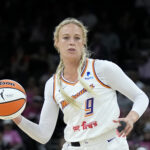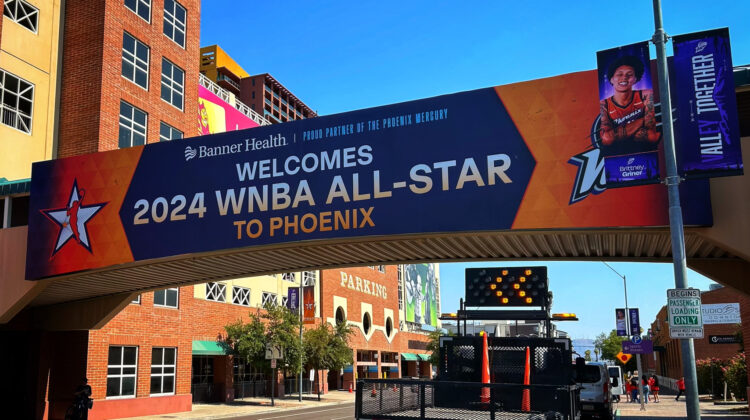By Jeff Metcalfe
The 20th WNBA All-Star Game, coming up July 20, bears little resemblance to its second and 12th predecessors in Phoenix.
In a year of living large for college and pro women’s basketball, the All-Star Game promises to be another inflection point ahead of the Paris Olympics and WNBA playoffs. TV viewership that hit a 16-year high last year almost certainly will push into millions for the first time given an ABC prime time telecast that will include Rookie of the Year contenders Caitlin Clark and Angel Reese. Their regular season meetings averaged 2.25 million (June 16) viewers on CBS and 2.3 million (June 23) on ESPN.
Clark and Reese are teammates for the first time on Team WNBA, challenging the U.S. Olympic team that left Clark in particular off, will be the main national storyline for All-Star weekend.
For the Phoenix Mercury, hosting such a highly anticipated game and ancillary events is a responsibility beyond even what Mat Ishbia imagined when he made bidding a priority upon becoming Suns/Mercury owner in February 2023. The All-Star Game was awarded to Phoenix in July 2023 then in March the NBA followed suit by entrusting its 2027 All-Star Game to the Suns.
Vince Kozar was a student at Scottsdale Desert Mountain High School when the Mercury first hosted the All-Star Game in 2000. Now he’s the Mercury president in his 12th season with the team (six others were with the Suns).
His journey is not unlike that of the All-Star Game, which once was like putting on the senior prom compared to planning a royal wedding today.
“The similarities are the motivation to have it as a gift to the fans and this community,” Kozar says. “The desire to show the entire women’s basketball world just how great the fans are here in Phoenix and how well they support this thing.”
“And honestly, it’s a gift to the [Mercury] players. It’s pretty special to play on your home court in front of your home fans. So those are the same. Nothing else is similar.”
Phoenix trying to top Las Vegas All-Star Games
For starters, the 2000 and 2014 All-Star Games were largely all about the game itself.
There was no day before skills challenge and 3-point shooting events either year although both had been held periodically starting in 2006. Both will be a major part of the third Phoenix All-Star experience on July 19 (limited tickets remain while the game itself is sold out).
WNBA Live also is new to Phoenix as part of the All-Star weekend for a third year. The festival will be held at the Phoenix Convention Center in what is billed as a celebration of basketball culture. It includes autograph opportunities with WNBA stars, merchandise, panel discussions, fan skill challenges and viewing parties.
“The number of parties, receptions, it doesn’t even compare,” Kozar says. “Then you layer on top of that Mat Ishbia and the standard he wants this at. It’s like nothing we’ve ever done and we don’t think anything like this has been done in the WNBA before. That’s just a way to say this is going to set a new standard and our hope is whoever does it next year does it even bigger than we do it.”
Three of the previous four All-Star Games were held in Las Vegas (2022 was in Chicago), setting a high bar for Phoenix.
“Vegas did a great job with it,” Kozar says. “We took staff members to Vegas last year to survey the entire thing and better understand it and make lists. That was the foundation for when we started planning. You’re going to really feel the All-Star Game in this city.”
The 2014 All-Star Game was planned by “probably 10 people at most,” Kozar says. “This thing is a massive undertaking that is our entire organization, the city and a ton of outside partners. There’s more WNBA people than have ever worked on it before. That’s just a massive difference. The budget from 2014 wouldn’t even recognize this budget. We took a much wider lens (than in 2014) from player hotels to hospitality to better considering retired players. It speaks to the level of interest in 2024.”
2000 ASG: Future Hall of Famers galore, Brandy Reed
The WNBA staged its first All-Star Game in 1999, the league’s third season, at New York’s Madison Square Garden.
Then Phoenix, one of eight original franchises only three of which remain in the same city, was up in 2000 largely because of its consistent five-figure attendance in the early years.
The All-Star Game drew 17,717 – just shy of a sellout – and featured six players now in the Naismith Memorial Basketball Hall of Fame. Another future Hall of Famer, Cynthia Cooper, sat out due to an ankle injury, opening a path for then WNBA Commissioner Val Ackerman to add the Mercury’s Brandy Reed to the West roster.
“We’ve at a very crucial period in our league,” Los Angeles’ Lisa Leslie said. “We know that the Phoenix fans are very supportive, and we need for them to be here at this game. If we need Brandy Reed here to get people in the stands then I think that’s something the league should have done, and it has.”
Jim Pitman, part of Mercury management from the outset and general manager for 10 years, remembers the 2000 All-Star Game for the crowd and a loaded West team that won 73-61.
“It wasn’t particularly well played (108 missed shots, 38 turnovers), but it was competitive,” Pitman says. “That’s what I have missed about All-Star Games recently. The competition level has deteriorated to where it just becomes purely an exhibition on scoring. That’s why I’m excited about this year because it’s really a tune-up for Team USA. At least there was a competition there [in 2000].”
Houston’s Tina Thompson (13 points/11 rebounds) was Most Valuable Player ahead of Leslie, who won the award in 1999, 2001 and 2002. No one scored more than 10 points for the East. Reed was 1-of-11 shooting in a season when she finished third in WNBA scoring (19.0 ppg).
“I wanted it bad,” Reed said. “I guess I was focused too much on entertaining and living up to expectations and anticipation. It was the off-court experience I’ll treasure the rest of my life.”
2014 ASG: Schimmel stars, Griner dunks
Eight of the first 27 WNBA seasons did not include an All-Star Game, primarily during years overlapping with the Olympics.
Those absences included 2010 and 2012 after which the league got back on schedule with All-Star Games in Connecticut (2013/2015) and Phoenix (2014).
The winning team first cracked 100 points in 2005 and all but two years since. 2014 was no exception, going into overtime (the only All-Star Game to do so) with the East prevailing 125-124.
Atlanta rookie reserve Shoni Schimmel, voted as an East starter in part because of her Native American fan support, scored a then All-Star record 29 points to earn MVP honors.
“I love being Native American,” Schimmel said, pertinent to Arizona where Rez Ball is a lifestyle in parts of the state. “For all these fans to come out and be here and to vote me into the game means a lot.”
The Mercury’s Diana Taurasi and Brittney Griner started for the West and Candice Dupree was a reserve. Griner, in her second pro season, scored 17 and dunked off a pass from Candace Parker in the second quarter.
“This is what the WNBA is about – spectacular moments, spectacular games,” East coach Michael Cooper said.
The game drew well (14,685) but was not a sellout. Perhaps because local fans were more interested in what was becoming the greatest Mercury team, already 18-3 and on a 12-game win streak going into the All-Star Game. That streak would reach 16 in a 29-5 regular season, all culminating with Phoenix’s third WNBA title in eight years.
“I don’t think that’s a normal season, but that’s a season I’ll never forget,” Kozar says.
2024: Goal of setting new standard for ASG
A decade after the 2014 All-Star Game, Taurasi, Griner and Nneka Ogwumike are returning to Phoenix for their 11th, 10th and ninth All-Star appearances.
The Mercury All-Stars, including Kahleah Copper, are on the U.S. Olympic team, vying in Paris for an eighth consecutive gold medal. Ogwumike, along with Clark and Reese, will play on Team WNBA in the same format used at the 2021 All-Star Game when Team WNBA won 93-85 over the national team, which went undefeated at the Tokyo Olympics.
Cheryl Reeve, West All-Star coach in 2014, is coaching Team USA as she will in Paris. She also was West All-Star Game winning coach in 2013 and 2017.
What happens on the court, though, is just a sliver of what the All-Star Game now entails.
Legacy projects include four renovated outdoor recreational basketball courts at Rose Mofford Sports Complex, another renovated court and Mercury mural at Chicanos Por La Causa De Colores domestic violence shelter and launch of an all-girls youth basketball league through Valley of the Sun YMCA that had 400 initial participants.
The first WNBA Changemaker Day (July 18) involves assembly of boxes with activities on life skills, STEM and outdoors to be distributed to 6,000 Girl Scouts in grade 4-8 across Arizona.
The second all-female Basketball Without Borders camp will bring 40 high-school prospects from 24 countries to Phoenix for training with former WNBA and FIBA players and coaches.
The WNBA and State Farm are donating $1,900 per assist during the All-Star to STEM education and mental wellness resources across the country.
Additionally, the Mercury are using the All-Star Game as a grand opening for their new practice facility at Footprint Center, an upgrade that will help to keep the franchise at the top of the league for free-agent consideration.
“We’re excited about what we’re doing at WNBA Live,” Kozar says. “We’re very excited about the entertainment we’re announcing. All of those things are designed to raise the level of the weekend for the entire league and also to differentiate Phoenix. Mat is really serious about what we’re building here. It’s easy to say that on day one of the press conference but when you see the resources behind our basketball side, when you see the practice facility, it’s really exciting.”
“We’re in the midst generally speaking of a cultural inflection point around this league and its athletes and the mainstream interest in it. That has translated to this [game].”
Pitman says Ishbia made the WNBA All-Star Game “priority No. 1” upon taking ownership of the Suns and Mercury. “It became a very important thing for him to do right by the women in the WNBA and put on an event that was worthy of who they are. That is all coming to fruition.”
“All the hard work is paying off. This is going to set the standard for all WNBA All-Star Games to come.”
Mercury guard Natasha Cloud says, “The WNBA has done a better job investing into fun things surrounding All-Star weekend. The parties. People really do enjoy going out and letting loose for the break we have in the middle of the season. I really want to see the USA team before they go off to the Olympics and to see the All-WNBA team go against them.”
“You’ve got players that feel snubbed so it engages the competitiveness more. That’s what fans love to see. More than anything, we’re getting to show our personalities more so this year than ever before. That produces a better product for our fans to watch.”
Related posts:

AP Photo/Ashley Landis
Brittney Griner reaches 2nd on Mercury all-time scoring list
AP Photo/Ross D. Franklin
Mercury miss playoffs for first time since 2012 Mercury Minute: Jeff Metcalfe talks Mercury playoff seeding, Natasha Cloud
Mercury Minute: Jeff Metcalfe talks Mercury playoff seeding, Natasha Cloud

(AP Photo/Matt York, File)
METCALFE: Phoenix Mercury could be re-setting without Taurasi & Griner
